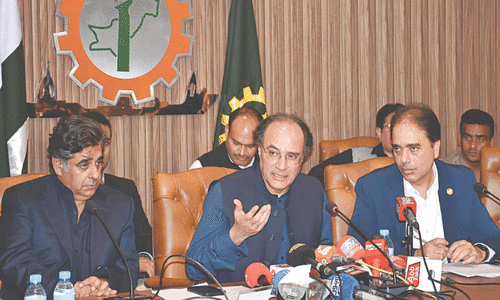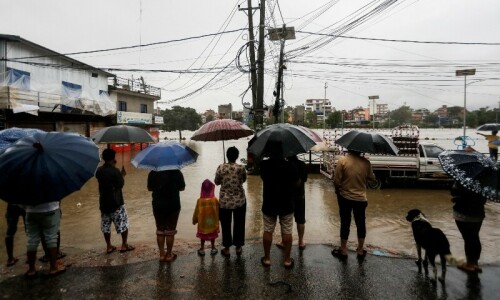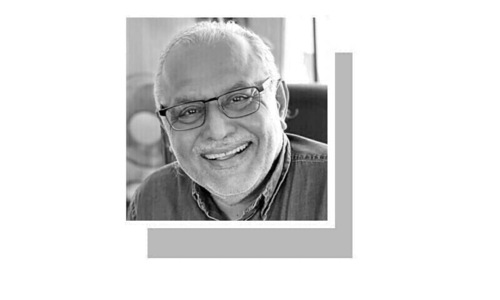LAHORE: Bakhshi, in his late 30s, earns his living by pasting large and small posters promoting movies, quacks, sages, clinics, shops, beauty parlours, and a host of other services and products on walls and electricity poles, and, sometimes, even on private vehicles in and around Laxmi Chowk. He is usually accompanied by two young boys in their early teens carrying a ladder, bucket full of glue, wiper and stick – his tools – for him. On any given working day, Bakhshi makes between two to five hundred rupees after working for eight to 12 hours. “My average earnings more than double when someone launches a mega promotion campaign,” he says.
The weeks in the run-up to the election in the past also used to be such high income yielding times for him. But no longer.
“This time around I have very little election-related business coming my way. Other people in this trade are also not getting much work,” a disappointed Bakhshi says. “In fact, I was foolish enough to turn down a couple of contracts recently in the hope of getting much bigger election campaign-related orders.”
The spending on election campaigns has always led to what economists fondly describe as the trickle-down effect. “It brings huge amounts of money — legal and illegal – into circulation. Once this money finds its way into the economy, it The immediately changes four to six hands, and, thus, has a multiplying effect on the economy,” says a professor of economics at a state-run university in Lahore.
He is averse to the ceiling imposed by the Election Commission of Pakistan (ECP) on money spent on canvassing by the candidates. “Before you talk about limiting the spending on election canvassing to a certain level, you should not forget the fact a major chunk of this money is unlocked by the candidates and their financiers from their idle investments in real estate, gold, bonds, etc, which always has a salutary effect on the economy. Besides, who has ever cared for the spending ceiling or what action has the ECP ever taken against those who violate its code of conduct,” he says.
Although the ECP has limited the campaign expense for a National Assembly candidate to Rs1.5 million and for a provincial assembly contestant to Rs1 million, most are spending in the range of Rs10 million to Rs100 million or even more to get to the assemblies.
“These ceilings are unrealistic and uncalled for in view of the prices of publicity materials and other election paraphernalia, which have skyrocketed in the last five years,” says a contestant for a provincial assembly seat. “Contesting an election is an expensive affair.”
Unlike the past, the campaign for Monday’s general election has had very little trickle-down effect so far. That is in spite of the fact that the political parties as well as individual candidates have beefed up their spending on their respective campaign.
Market reports say the campaign budgets of the three major parties –Pakistan People’s Party, Pakistan Muslim League-N and Pakistan Muslim League-Q, run into billions of rupees. Just like PML-Q, which has outpaced its rivals in running the most expensive election campaign in the history of the country, its candidates are also spending huge amounts of money on their canvassing.
“This time around you don’t find the kind of trickle-down effect election-related spending used to produce in the past because all the political parties and contestants are focusing more on campaigning through electronic (cable TV) and print media or using technologically far better means of outdoor publicity,” says an executive from a major advertising agency in Lahore.
“Since large portions of the campaign funds are going to electronic and print media or other expensive publicity tools, the poorer workers (like Bakhshi) are not benefiting much. In the past, the election campaigns would involve people from different trades and thus create more temporary jobs and work. Banner-making, for example, involved cloth and string makers and sellers, painters, labour, etc,” he says.
“But the new technology and publicity techniques and explosion of the electronic media has changed the election publicity scene. The technology offers you better, more effective, faster and safer means to reach your voters at lesser cost.
“For example, mobile phones enable you to text two-line message to hundreds of thousands of voters without spending a lot. Same is the case with cable TV: you can reach voters in their living rooms 24/7 at a far lower cost than could be done in the past. You don’t have time to reach hundreds of thousands of voters in your constituency even if you are conducting a vigorous door-to-door campaign, but the cable TV and text messages take you to every home, every individual voter. What else do you need? Besides, the poor security environment across the country is keeping both voters and contesting candidates away from political gatherings,” the executive says.
He says the campaign budgets of candidates may have swelled in absolute terms due to use of new means of publicity. But, he insists, “If you compare the outreach of new means with the traditional publicity tools, today you get greater value for your money.”
But the new publicity techniques have reduced temporary jobs and the chances of the poorer people from making some money from the election canvassing as well.
Some do not agree that the new publicity techniques are preventing trickle-down effect of campaign spending. “That is partly true. But there is lot also making its way down to the unskilled and semi-skilled labour as well. If some people in a certain trade or business or skill are not making money, others in another trade, business or skill are doing so,” says a businessman. “When you spend money, some make more money than others. It has always been like that. Even when cloth banners or posters or painted signboards were the main tools of publicity, the unskilled labour didn’t make much. However, it is correct to say that the number of people, especially in the labour class, who used to benefit a lot from such huge expense on publicity, has dwindled due to the recent technological advancement.”
Ends/nasir













































Dear visitor, the comments section is undergoing an overhaul and will return soon.